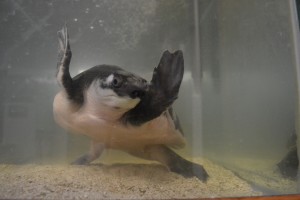Welcome to the family Squirt: Biology lab adds Fly River turtle

Squirt is a Fly River turtle who was just added to the Waldorf College biology lab. Photo by Audrey Sparks
By Audrey Sparks
The Waldorf College biology lab is home to a very diverse family including sugar gliders, rats and salamanders. Recently a new member has been added. Squirt, a Fly River turtle, was donated by biology lab manager, Alyse DeVries’ father, Lynn Devries, in the hopes of providing a new learning tool for the students.
“The Fly River turtle has always been a species rare in captivity, at least here in the USA,” Lynn said. “I consider them to be a species worthy of educational display at institutions such as Waldorf College, as opposed to private pet ownership.”
Fly River turtles are a unique species with a blunt, thick breathing tube shaped snout which gives them their nickname of Pig-Nosed turtle. They share a number of parallels to sea turtles, but they live in fresh water allowing them to easily be homed in an aquarium environment. Although fossils have been found in Europe, North America and Southern Asia the species is now restricted to the Fly River area of southern New Guinea and the Daly River area in northern Australia. They are omnivorous, generally feeding on a wide variety of plant and animal matter. Adults can grow to 20-25 inches in length and weigh up to 40 pounds.
“I acquired squirt as a small turtle of approximately 4 inches in length, about 10 years ago. I estimate him to be 12 years old now,” Lynn said.
Squirt has become quite the popular man on campus attracting a great deal of attention, which was one of the reasons he was added to the biology lab animal collection.
“I feel that he has sparked an interest in people who may not normally pay attention to our laboratory animals or animals in general,” Alyse said. “Hopefully his peculiar nature will motivate students to explore the not-so-familiar species and opportunities found within the biological field.”
Paul Bartelt, Waldorf professor of biology, has no previous experience with the Fly River turtle, but recognizes the benefits of having such creatures in the lab.
“We have no intentions of turning the biology labs into a small zoo, but we do want a diversity of plant and animal life to illustrate even a tiny fraction of diverse adaptations for our students,” Bartelt said. “After all, what kind of biology labs would these be without life in them?”
Alyse worked with three adult Fly River turtles for over six years when she was employed at the Omaha Zoo. Because of her previous experience she recognizes the needs Squirt will have in the future.
“Squirt is a little over half grown and we would love to explore the options of one day investing in a larger enclosure,” Alyse said. He is currently housed in a 75 gallon aquarium. They can also be sensitive to poor water quality, which is why there are goldfish in the tank with Squirt to help keep the water cleaner.
The biology lab is open during class hours and students, faculty, staff and community members are invited to come interact with Squirt as long as class is not in session. He seems to be quite social.
“Watching it (Squirt) swim, feed and interact with others is a lot of fun,” Bartlet said.
